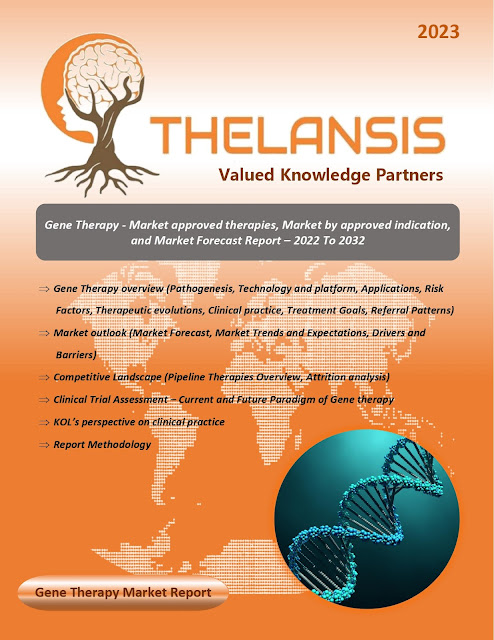Gene Therapy – Market Outlook, Epidemiology, Competitive Landscape, and Market Forecast Report – 2022 To 2032
Gene Therapy
·
Gene therapy is a cutting-edge medical
approach that involves manipulating a person's genes to treat or even cure
diseases. This revolutionary technique encompasses various mechanisms to
achieve its objectives:
·
·
Replacing Faulty Genes: One approach is
substituting disease-causing genes with healthy counterparts, effectively
restoring normal gene function within the individual's cells.
·
Inactivating Dysfunctional Genes: Some gene
therapies focus on deactivating genes malfunctioning or causing diseases,
thereby mitigating their harmful effects.
·
Introducing Modified Genes: Another method
involves introducing new or modified genes into the body to combat specific
diseases or medical conditions.
·
Primarily confined to research laboratories,
gene therapy is still experimental. However, it rapidly evolves into a viable
therapeutic option and combines gene therapy with other treatments like immune
modulation, chemotherapy, and radiotherapy. Gene therapy can be broadly
classified into two categories: germinal and somatic. Germinal gene therapy
involves introducing genes into somatic cells and an individual's germline. It
not only cures the genetic disease but can also pass the altered trait to some
of the individual's gametes. On the other hand, somatic gene therapy targets
non-reproductive or somatic tissues to correct genetic diseases. Dysfunctional
cells are removed and replaced with cloned wild-type genes. These corrected
genes then provide the necessary function to alleviate disease symptoms.
Typically, not all affected cells need modification, only enough to alleviate
symptoms. Gene therapy products are being researched for their potential to
treat diseases such as cancer, genetic disorders, and infectious diseases.
Several types of gene therapy products are being explored:
·
·
Plasmid DNA: Circular DNA molecules engineered
to carry therapeutic genes into human cells.
·
Viral Vectors: Modified viruses with their
infectious capabilities removed, used as vehicles to deliver therapeutic genes
into human cells.
·
Bacterial Vectors: Non-harmful bacteria
serving as carriers to transport therapeutic genes into human tissues.
·
Human Gene Editing Technology: Gene editing
aims to disrupt harmful genes or repair mutated ones.
·
Patient-Derived Cellular Gene Therapy
Products: Cells are extracted from the patient, genetically modified (often
using viral vectors), and reintroduced into the patient's body.
·
Gene therapy holds immense promise for the
future of medicine, offering effective treatment and potential eradication of a
wide range of diseases.
Thelansis’s “Gene Therapy Market
Outlook, Epidemiology, Competitive Landscape, and Market Forecast Report – 2022
To 2032" covers disease overview, epidemiology, drug utilization,
prescription share analysis, competitive landscape, clinical practice,
regulatory landscape, patient share, market uptake, market forecast, and key
market insights under the potential Gene Therapy treatment modalities options
for eight major markets (USA, Germany, France, Italy, Spain, UK, Japan, and
China).
KOLs insights
of Gene Therapy across 8 MM market from the centre of Excellence/ Public/
Private hospitals participated in the study. Insights around current treatment
landscape, epidemiology, clinical characteristics, future treatment paradigm,
and Unmet needs.
Gene Therapy Market Forecast Patient
Based Forecast Model (MS. Excel Based Automated Dashboard), which Data Inputs
with sourcing, Market Event, and Product Event, Country specific Forecast
Model, Market uptake and patient share uptake, Attribute Analysis, Analog
Analysis, Disease burden, and pricing scenario, Summary, and Insights.
Thelansis Competitive Intelligence (CI) practice
has been established based on a deep understanding of the pharma/biotech
business environment to provide an optimized support system to all levels of
the decision-making process. It enables business leaders in forward-thinking
and proactive decision-making. Thelansis supports scientific and commercial
teams in seamless CI support by creating an AI/ ML-based technology-driven
platform that manages the data flow from primary and secondary sources.

Comments
Post a Comment